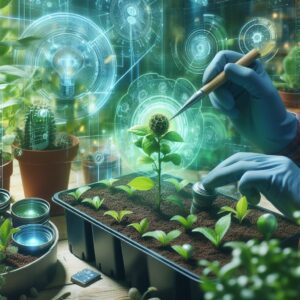Introduction: Cultivating Green Intelligence
As technology continues to weave its way into various aspects of our daily lives, it has also found a place in our gardens. Smart gardening tools and plant sensors are transforming traditional gardening into an intelligent and connected experience. This article delves into the world of smart gardening, exploring the innovative tools and sensors that are helping both seasoned gardeners and novices cultivate thriving green spaces.
The Rise of Smart Gardening:
Smart gardening represents the integration of technology into traditional gardening practices, enabling individuals to monitor, manage, and optimize their garden spaces with greater efficiency. From automated irrigation systems to plant health monitoring, these smart tools aim to make gardening more accessible and enjoyable.
Smart Irrigation Systems:
Water conservation is a crucial aspect of responsible gardening. Smart irrigation systems utilize sensors to assess soil moisture levels, weather conditions, and plant requirements. These systems can automatically adjust watering schedules, ensuring that plants receive the optimal amount of water while minimizing waste. This not only promotes healthier plants but also contributes to sustainable water usage.
Plant Sensors for Data-Driven Growth:
Plant sensors are small devices that can be inserted into the soil to gather real-time data about the environment surrounding your plants. These sensors measure soil moisture, temperature, light levels, and nutrient content. The collected data is then transmitted to a smartphone or computer, providing gardeners with valuable insights into the specific needs of their plants. This data-driven approach allows for more informed decision-making regarding watering, fertilizing, and overall plant care.
Connected Gardening Apps:
Smart gardening tools often come paired with dedicated mobile apps that serve as a centralized hub for monitoring and controlling various aspects of your garden. These apps can provide alerts about changing weather conditions, offer gardening tips based on real-time data, and even suggest plant varieties that thrive in your specific location. Connected gardening apps empower users to manage their garden remotely, enhancing convenience and accessibility.
Automated Planters and Indoor Gardens:
For urban dwellers or those with limited outdoor space, smart gardening extends into the realm of automated planters and indoor gardens. These systems often incorporate features such as built-in grow lights, automated watering systems, and climate control. Users can grow herbs, vegetables, and even flowers indoors with minimal effort, bringing the joys of gardening to spaces that might not traditionally support it.
Robotic Lawn Mowers:
Lawn maintenance gets a technological upgrade with robotic lawn mowers. These autonomous devices can mow the lawn with precision, navigating the terrain and avoiding obstacles. Users can schedule mowing sessions, and some models even return to their charging stations automatically. Robotic lawn mowers not only save time but also contribute to the health of the lawn by cutting grass more frequently and evenly.
Smart Pest Control:
Smart gardening tools also address the age-old challenge of pest control. Connected devices can monitor for pests and diseases, sending alerts when unusual activity is detected. This allows gardeners to take proactive measures, whether it be introducing natural predators or using targeted, eco-friendly pesticides.
Environmental Benefits:
Beyond the convenience they offer, smart gardening tools contribute to environmental sustainability. By optimizing resource usage, reducing water waste, and promoting healthier plant growth, these tools align with eco-conscious gardening practices. The data-driven approach also minimizes the use of chemical inputs, fostering a more natural and sustainable garden ecosystem.
Conclusion: Cultivating Green Intelligence
Smart gardening tools and plant sensors are ushering in a new era of precision and convenience for both novice and experienced gardeners. By harnessing technology to monitor and manage various aspects of gardening, these tools empower individuals to cultivate healthier plants, conserve resources, and create more sustainable and enjoyable garden spaces. As technology continues to advance, the future of smart gardening holds exciting possibilities for greener, smarter, and more connected landscapes.
For more Article like this, visit our Website Here

